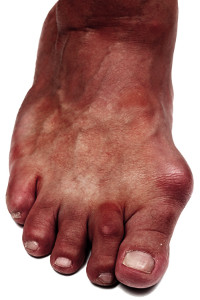
(616) 846-3400
Fax: (616) 846-3406

(616) 846-3400
Fax: (616) 846-3406
 If you notice a bony protrusion that may look like a permanent deformity on the side of your big toe, you may have what is known as a bunion. It may develop as a result of wearing shoes that do not have adequate room for the toes to move freely in, or possibly from a genetic trait. Some of the symptoms that are associated with this condition may be tenderness and swelling, in addition to burning or tingling sensations. If having this ailment interferes with wearing shoes and completing daily activities, many patients may choose to undergo surgery for permanent removal of the bunion. For less severe bunions, orthotics may be prescribed which may provide mild relief. If properly fitting shoes and socks are worn, painful and uncomfortable bunions may possibly be prevented. If you are affected by bunions, it is advised to speak to a podiatrist who can properly diagnosis and offer correct treatment techniques.
If you notice a bony protrusion that may look like a permanent deformity on the side of your big toe, you may have what is known as a bunion. It may develop as a result of wearing shoes that do not have adequate room for the toes to move freely in, or possibly from a genetic trait. Some of the symptoms that are associated with this condition may be tenderness and swelling, in addition to burning or tingling sensations. If having this ailment interferes with wearing shoes and completing daily activities, many patients may choose to undergo surgery for permanent removal of the bunion. For less severe bunions, orthotics may be prescribed which may provide mild relief. If properly fitting shoes and socks are worn, painful and uncomfortable bunions may possibly be prevented. If you are affected by bunions, it is advised to speak to a podiatrist who can properly diagnosis and offer correct treatment techniques.
If you are suffering from bunion pain, contact Dr. Robbi Young of Grand Haven Foot & Ankle. Our doctor can provide the care you need to keep you pain-free and on your feet.
What Is a Bunion?
Bunions are painful bony bumps that usually develop on the inside of the foot at the joint of the big toe. As the deformity increases over time, it may become painful to walk and wear shoes. Women are more likely to exacerbate existing bunions since they often wear tight, narrow shoes that shift their toes together. Bunion pain can be relieved by wearing wider shoes with enough room for the toes.
Causes
Symptoms
In order to diagnose your bunion, your podiatrist may ask about your medical history, symptoms, and general health. Your doctor might also order an x-ray to take a closer look at your feet. Nonsurgical treatment options include orthotics, padding, icing, changes in footwear, and medication. If nonsurgical treatments don’t alleviate your bunion pain, surgery may be necessary.
If you have any questions, please feel free to contact our office located in Grand Haven, MI . We offer the newest diagnostic and treatment technologies for all your foot care needs.